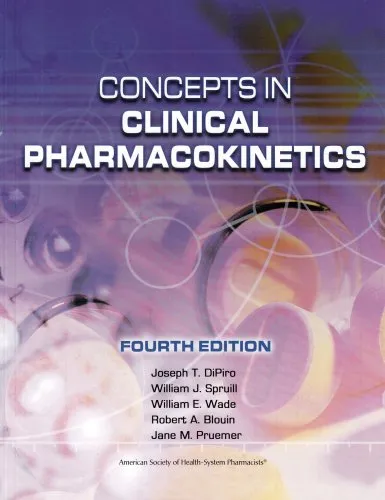Concepts In Clinical Pharmacokinetics
4.7
Reviews from our users

You Can Ask your questions from this book's AI after Login
Each download or ask from book AI costs 2 points. To earn more free points, please visit the Points Guide Page and complete some valuable actions.Related Refrences:
Introduction to "Concepts In Clinical Pharmacokinetics"
"Concepts In Clinical Pharmacokinetics" is a comprehensive and approachable guide designed to introduce pharmacy students, clinicians, and healthcare professionals to the foundational and practical principles of pharmacokinetics. Written by experts Joseph T. DiPiro, William J. Spruill, William E. Wade, Robert A. Blouin, and Jane M. Pruemer, this book bridges the gap between complex pharmacokinetic theories and their application in clinical practice. Whether you're new to this subject or looking to refine your understanding, this text provides clear, concise, and methodical insights into how pharmacokinetics underpins effective patient care.
With a focus on making pharmacokinetics accessible, each concept is explained with real-world examples, step-by-step equations, and patient scenarios, offering learners the context they need to apply these principles confidently. This book also emphasizes problem-solving and critical thinking, encouraging readers to apply their knowledge to optimize drug therapy and contribute to improved patient outcomes.
Detailed Summary of the Book
The book is divided into structured chapters that build progressively from foundational principles to advanced clinical applications. Early chapters provide an introduction to basic pharmacokinetics concepts such as absorption, distribution, metabolism, and elimination. These are the essential processes through which drugs move through the body and exert their effects.
The authors then guide readers into more quantitative areas, including the interpretation of pharmacokinetic parameters such as half-life, volume of distribution, clearance, and bioavailability. Practical, hands-on problems and exercises allow readers to calculate these figures and understand their relevance in practice.
In the later chapters, the focus transitions to clinical applications. The book delves into designing individualized drug regimens, incorporating therapeutic drug monitoring (TDM), and adjusting doses for special populations, such as patients with kidney or liver impairment. Other topics include the pharmacokinetics of drugs commonly requiring TDM, extended dosing intervals, and the application of population pharmacokinetics.
Each chapter follows a systematic format, containing learning objectives, solved examples, practice questions, and case studies to help solidify the material. Additionally, appendices provide detailed reference tables and equations to support quick recall and actual clinical use.
Key Takeaways
- Comprehensive coverage of basic and advanced pharmacokinetics principles.
- Practical problem-solving exercises and case studies that simulate real-world clinical scenarios.
- Clear explanations of therapeutic drug monitoring and dose adjustments for special populations.
- Step-by-step guidance on calculations related to half-life, clearance, bioavailability, and more.
- User-friendly structure with learning objectives, solved examples, and review questions for self-assessment.
Famous Quotes from the Book
"Understanding pharmacokinetics is not merely about memorizing equations but about grasping how these principles translate into effective, individualized patient care."
"Optimizing drug therapy requires mastery of both science and strategy, achievable only through rigorous study and real-world application of pharmacokinetics."
"Therapeutic drug monitoring bridges the gap between theoretical models and clinical outcomes, allowing us to refine and personalize patient treatment plans."
Why This Book Matters
As the healthcare landscape becomes increasingly individualized, the importance of understanding pharmacokinetics has never been greater. "Concepts In Clinical Pharmacokinetics" empowers healthcare professionals to make more informed decisions about drug therapy, ensuring treatments are safe, effective, and tailored to meet the unique needs of each patient.
The book's accessible format and practical approach make it an indispensable resource for pharmacy students seeking to build a strong foundation in pharmacokinetics, seasoned practitioners refreshing their knowledge, and healthcare teams working collaboratively toward optimal patient outcomes. By combining theoretical rigor with clinical relevance, this text defines what it means to practice precision medicine effectively.
In summary, "Concepts In Clinical Pharmacokinetics" is more than just a textbook—it is a crucial tool for learning, applying, and building confidence in the principles that guide patient-centered pharmacotherapy.
Free Direct Download
You Can Download this book after Login
Accessing books through legal platforms and public libraries not only supports the rights of authors and publishers but also contributes to the sustainability of reading culture. Before downloading, please take a moment to consider these options.
Find this book on other platforms:
WorldCat helps you find books in libraries worldwide.
See ratings, reviews, and discussions on Goodreads.
Find and buy rare or used books on AbeBooks.
1272
بازدید4.7
امتیاز50
نظر98%
رضایتReviews:
4.7
Based on 0 users review
"کیفیت چاپ عالی بود، خیلی راضیام"
Questions & Answers
Ask questions about this book or help others by answering
No questions yet. Be the first to ask!



